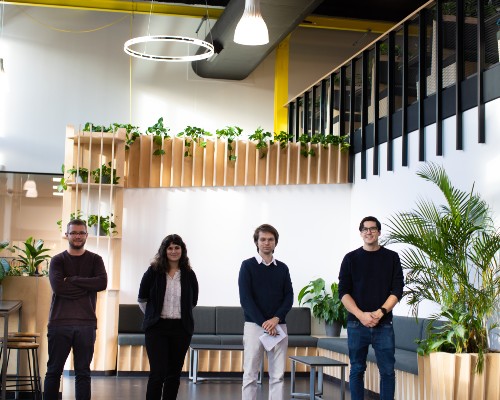
L to R: Fred Garzoni from Imophoron Ltd, Dr Rachel Millet and Arthur Belaud from the French Embassy Innovation Branch, and Dr Harry Destecroix, Science Creates founder at Science Creates second facility in Bristol's Old Market

L to R: Arthur Belaud from the French Embassy, Dr Anne Westcott from the University, Dr Rachel Millet from the French Embassy and Professor Imre Berger at the University's Max Planck Bristol Centre for Minimal Biology
Press release issued:
10 December 2021
Representatives from the French Embassy visited University labs today [10 December] to see some of the innovative COVID-19 research being undertaken at Bristol, including work on ADDomer™, a thermostable vaccine platform being developed by Bristol scientists to combat emerging infectious diseases.
Dr Rachel Millet and Arthur Belaud from the Embassy’s Innovation Branch, which seeks to drive France-UK business enterprise, met with scientists Professor Imre Berger and Frederic Garzoni, founders of Imophoron Ltd, the biotech start-up developing ADDomer that uses technology developed at an institution in France, and recently secured £4 million investment.
During the visit, the delegation took a tour of labs in the University’s Max Planck-Bristol Centre for Minimal Biology (MPBC), the GW4/Wellcome Trust Cryo-EM facility led by Prof Christiane Schaffitzel, and Science Creates, the Bristol-based incubator, which is operated in partnership with the University and supports scientists and engineers in commercialising ground-breaking innovations. Having recently opened its second facility in the city’s Old Market, the party met with Science Creates founder and Bristol graduate Dr Harry Destecroix to discuss the future of deep-tech eco-systems.
Professor Imre Berger, Director of Bristol’s Max Planck Centre for Minimal Biology, said: “We are honoured to host this visit from the French Embassy’s Innovation Branch to share knowledge and showcase the pioneering research that is being done in collaboration with our European colleagues and institutions.”
Further information
About the Max Planck Bristol Centre for Minimal Biology
The Max Planck Bristol Centre for Minimal Biology was founded in 2019 by the University of Bristol and the Max Planck Society. The Centre pursues game-changing research and postgraduate training in the emerging field of minimal biology to address some of the most complex challenges in fundamental science. The GW4 Facility for High-Resolution Electron Cryo-Microscopy is closely aligned with the Wolfson Bioimaging Facility and provides world class cryo-microscopy and analysis tools, enabling researchers from diverse disciplines across the Great West region and beyond to study molecular processes using single-particle cryo-EM or cryo-tomography.
About Imophoron Ltd – innovative vaccine company
Bristol start-up Imophoron’s ambition is to bring about a revolution in the fight against deadly pathogens and to tackle current challenges unmet by the vaccine industry with Imophoron’s next-generation vaccine development platform. Imophoron is winner of the 2019 Launch Great West Global Good Award. When the pandemic crisis started, Imophoron’s CEO, Fred Garzoni, rejoined Professor Berger’s group at University of Bristol to produce reagents for the scientists in the Bristol UNCOVER group, and to develop an ADDomer based COVID-19 vaccine.

